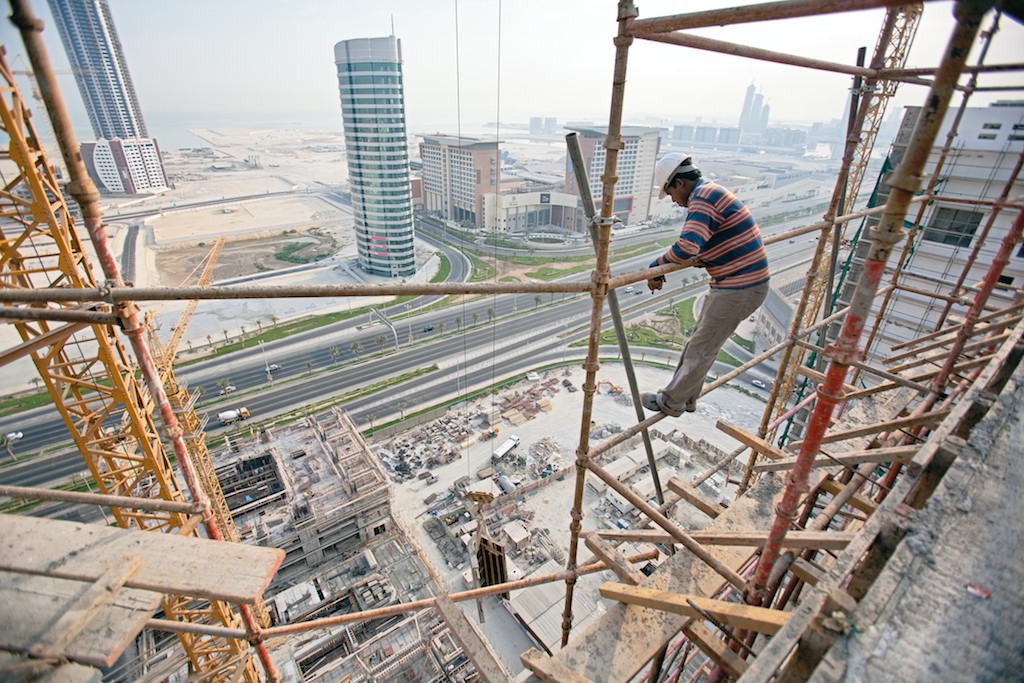In early August, more than 50 construction workers gathered to protest unpaid wages in Bahrain. The group claimed that almost 200 employees had not been paid since last November. According to local media reports, one protesting employee stated that the company had falsely informed the government that the dues had been paid in order to clear its owners of a travel ban imposed by a court for failing to compensate suppliers. The protesters worry that if the ban is lifted, the owners may leave Bahrain and never return.
Additionally the protestor stated that Bahraini employees had been paid, while expatriate workers had not. Despite the withholding of wages, employees continued to work until April, with five months of total pending pay. The company is reportedly refusing to communicate with the expatriate workers, to the extent that when employees tried to enter company property to gain clarification, their access was denied.
The recent demonstration is at least the third organized by migrant workers protesting abusive labor conditions this year, with other gatherings held in June and March. One of most severe problems faced by migrant workers is wage withholding, or when employers defer or refuse to pay wages. In a 2012 Human Rights Watch report, half of interviewed migrant workers stated that their employers withheld their wages between three to ten months. Such violations are exacerbated by other abuses – including excessive hours, poor labor and housing conditions, and even physical or sexual assault.
While expatriates make up approximately 52% of Bahrain’s population and 80% of the country’s workforce, there are few legal protections available to them. The kingdom has long failed to eliminate abuse and discrimination under the kafala system, which is a complicated web of sponsoring migrant workers through the Labor Marker Regulatory Authority. (LMRA) Kafala puts an immense amount of power in the hands of sponsors, which are often private employers and companies. For example, in this system sponsors have control over the migrant worker’s ability to change occupations or leave a job. If a migrant worker were to do so without permission, the sponsor could cancel the person’s visa, effectively classifying them as an illegal resident. This not only means that the migrant worker faces deportation, but potentially time in jail as well. Moreover, the system does not allow for migrants to effectively seek legal remedy when their rights have been violated. Reaching out and filing a complaint may put them at odds with their sponsor, who has the power to cancel their visa.
Though the government indicated that it would replace the system in 2009, authorities have failed to repeal or replace most of the procedures. In the years since, Bahraini authorities have proposed legislation and undertaken small scale test programs with the stated objective of reforming the kafala system. However, it is unclear if the most recent of these programs – a new Flexi Permit system – will ultimately prove helpful or detrimental to migrant workers, as it may deny them benefits and force them to pay hefty health care and regulatory fees that were previously taken on by the employer.
Still, reform is desperately needed. With over 600,000 expatriates and no minimum wage established, labor conditions remain poor for many migrant workers in Bahrain. While there are laws in place to guarantee safe and clean housing for expatriate workers, for example, many continue to reside in dangerous unregistered labor camps across the country.
In addition to the recent protests over wage withholding, several other cases of migrant rights abuses have emerged over the past month. For example, Udair Karuppaiah, an Indian native, will finally be given the chance to return to home after being forced to live illegally for two years in Bahrain. Karuppaiah first travelled to Saudi Arabia seven years ago as a migrant laborer before his Saudi sponsor left him in Bahrain without any money or food. Karuppaiah is a father to two mentally challenged children, and he sought out labor in the Gulf as a means to help pay for their treatment. Karuppaiah asked his sponsor repeatedly to pay him so that he could send money home to his children, but his requests were denied. Karuppaiah’s daughter passed away in April 2016, and he did not get the chance to see her before she died. Karuppaiah’s passport expired and his sponsor failed to renew his visa so he was virtually stranded in Bahrain without a way to return to his family. Now, the Indian embassy has reportedly secured Karuppaiah travel back to his home country – he is expected to leave Bahrain within a month, after settling outstanding dues.
Karuppaiah’s situation is not uncommon, as demonstrated by a similar case reported just a day later. Hafeez Khan, after 35 years of service in the Pakistani embassy in Bahrain, slipped into a coma and passed away due to cancer. He left behind a family that does not have the legal documentation to go back to Pakistan or to stay in Bahrain. The family has been working with the Pakistani embassy in order to secure a solution; however, it has yet to see much success.
Nevertheless, the Bahraini government has also taken some steps to combat migrant rights abuse in recent weeks. On 29 August the First High Criminal Court in Bahrain heard a case against two recruiters accused of illegally possessing more than 800 passports belonging to Asian migrant laborers. Bahraini police claim that the pair had used fake registrations to recruit workers and sold residency permits for large sums of money. Although deep flaws within Bahrain’s legal system will continue to undermine the government’s ability to implement effective criminal justice barring substantial reform, it is imperative that authorities continue to work to eliminate migrant rights violations and hold perpetrators – including government officials – accountable. As demonstrated by the sheer number of affected workers in this particular case, migrant labor exploitation remains widespread in Bahrain.
Emily Stone is an Advocacy Intern at ADHRB.
Photo via Migrant-Rights.org





